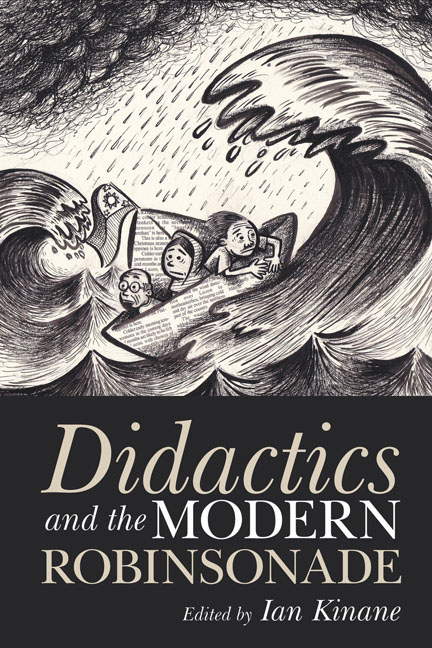Book contents
- Frontmatter
- Dedication
- Contents
- Notes on Contributors
- Foreword: The Progressive Pedagogies of the Modern Robinsonade
- Introduction: The Robinsonade Genre and the Didactic Impulse: A Reassessment
- 1 ‘What a Crusoe crowd we shall make!’: Destabilising Imperialist Attitudes to Space in G. Warren Payne's Three Boys in Antarctica
- 2 Borrowing (from) Crusoe: Library Books and Identity Formation in the Irish Free State
- 3 Navigating Nationhood, Gender, and the Robinsonade in The Dreams of Myfanwy
- 4 Call it Courage and the Survival of the Imperial Robinsonade
- 5 Shifting Perspectives in Two Mid-Twentieth-Century Robinsonades
- 6 Between Communitas and Pantheism: Terry Pratchett's Nation as a Post-Christian Robinsonade for a Postcolonial World
- 7 Romance, the Robinsonade, and the Cultivation of Adolescent Female Desire in Libba Bray's Beauty Queens
- Index
2 - Borrowing (from) Crusoe: Library Books and Identity Formation in the Irish Free State
- Frontmatter
- Dedication
- Contents
- Notes on Contributors
- Foreword: The Progressive Pedagogies of the Modern Robinsonade
- Introduction: The Robinsonade Genre and the Didactic Impulse: A Reassessment
- 1 ‘What a Crusoe crowd we shall make!’: Destabilising Imperialist Attitudes to Space in G. Warren Payne's Three Boys in Antarctica
- 2 Borrowing (from) Crusoe: Library Books and Identity Formation in the Irish Free State
- 3 Navigating Nationhood, Gender, and the Robinsonade in The Dreams of Myfanwy
- 4 Call it Courage and the Survival of the Imperial Robinsonade
- 5 Shifting Perspectives in Two Mid-Twentieth-Century Robinsonades
- 6 Between Communitas and Pantheism: Terry Pratchett's Nation as a Post-Christian Robinsonade for a Postcolonial World
- 7 Romance, the Robinsonade, and the Cultivation of Adolescent Female Desire in Libba Bray's Beauty Queens
- Index
Summary
At a lecture given in San Francisco in 1899, a Father Peter Yorke remarked that ‘if they could tow Ireland out into the Atlantic and free it entirely from English and continental influences that such a measure would not be too much to restore to Ireland her diminishing nationality’ (Flanagan, 2006, 44). However, geographical remoteness from the British Isles was little protection from a colonial Britain which successfully amassed a global empire. This is reflected in Robinson Crusoe and many of its eponymous subgenre narratives, in which the perceived superiority of western European culture and governance is imposed on indigenous peoples in far-flung (often island) locations. Irish nationalists anticipated the restoration of a prelapsarian island on which an authentic and uncontaminated Gaelic culture could flourish once more with the withdrawal of colonial rule by neighbouring Britain: effectively a mutiny on Crusoe's island. When (a compromised) independence was achieved, part of the momentum to purge the new state of its colonial legacy involved the exclusion of British print material which did not align with the nation's view of itself as a self-governing and distinctively Irish state. Nonetheless, Defoe's Robinson Crusoe and other Robinsonade texts continued to be acquired for the children's collection of Cork city's public library throughout the 1920s and ‘30s, despite their explicit endorsement of colonialism. This chapter discusses selected examples of these texts from the children's collection, demonstrating that colonial and anti-colonial discourses coexisted in the new state, and proposes that the didacticism of colonial narratives both influenced Irish writing and could also be transformed by the sociopolitical environment in which British colonial narratives were consumed.
The centrality of the cultural revival to the broad nationalist movement that had finally culminated in the War of Independence and the creation of the Irish Free State meant that the promotion of an Irish national culture and the ‘de-anglicising’ of Ireland were important priorities for the new administration. Thus the Irish language was made an official language of the state and became central to the education system. The association of Catholicism with Irish identity was increasingly emphasised, and the rejection of what was ‘foreign’ and ‘impure’ was crystallised in the introduction of stricter censorship legislation, including the Censorship of Publications Act, 1929.
- Type
- Chapter
- Information
- Didactics and the Modern RobinsonadeNew Paradigms for Young Readers, pp. 73 - 90Publisher: Liverpool University PressPrint publication year: 2019



